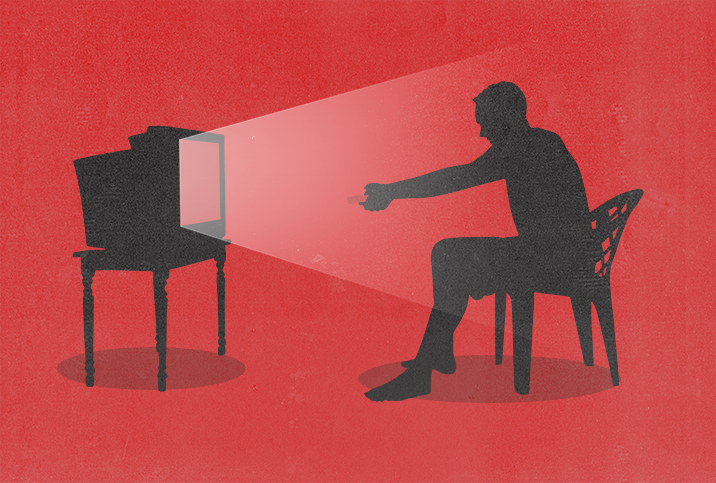What Kind of Standards Does the Porn Industry Have for Safer Sex?

If we generalize about the results of a 2020 study on pornography consumption, it's pretty fair to say most adults consume some form of porn in their lifetime.
Of the people surveyed, 91.5 percent of men and 60.2 percent of women reported they had consumed pornography within the past month. In 2018, the video website Pornhub reported it had amassed 33.5 billion visits, so it's also safe to say a lot of porn consumption is in the form of videos.
Many of the people in these videos aren't just having sex on camera for the fun of it—they're also on the job.
Does the porn industry care about STIs?
The pornography industry is an industry like any other, in that just as there are health and safety measures in place for ER nurses, contractors and professional athletes, there are measures in place to keep porn actors safe from sexually transmitted infections/diseases (STIs/STDs) such as herpes.
"Standards are in place to improve safety in every industry, including adult entertainment," said Danae Maragouthakis, M.B.B.S., M.P.H., CEO and medical director at Yoxly, a provider of at-home STI test kits based in Oxford, England.
There's something bigger to note here than the presence of STD prevention measures in the making of pornography, however.
Preventing STDs requires the occasional screening—or in the case of the porn industry, mandated screenings—but there also needs to be destigmatization of discussions about STDs and sexual health in general. The subject requires transparency, open communication and education.
What do STD prevention measures look like in the porn industry? How can we take a cue from them to treat sexual health discussions as a normal part of life, no matter what industry we work in?
How do you check for herpes and other STIs in the porn industry?
The best way to prevent STDs is to know and consistently practice the principles of safer sex, which starts with proper sexual education.
"Safer sex" is a term often used in place of "safe sex" because no type of sex with a partner can be guaranteed 100 percent safe.
Being knowledgeable about the various ways STDs can spread is a great place to start.
"Stay educated about STDs. Knowing how STDs are spread and what areas of the body they can infect will help you take appropriate preventative measures," Maragouthakis said. "Many STIs can be picked up or passed on through oral, vaginal and/or anal sex, which means that they can infect the oropharynx [mouth and throat], genitals and/or rectum."
A common misconception about STDs is they can be spread only through vaginal or anal penetrative sex. Some STDs can be spread through blood, saliva or skin-to-skin contact regardless of the method of penetration. Additionally, proper sex toy care is necessary to avoid spreading STDs that can be transmitted through various bodily fluids.
"STIs can be spread via sex toys contaminated with infected bodily fluids," Maragouthakis said. "For example, hepatitis B can survive outside the body on inanimate objects for weeks at a time. So put fresh condoms on sex toys, if possible, and be sure that all toys are thoroughly cleaned before each use."
Barrier methods, such as condoms, and regular STD screenings can go a long way toward keeping yourself and your partners safe from infection.
In fact, the porn industry has its own system of monitoring regular STD screening results, which helps keep actors safe and healthy.
What is the PASS system?
The Performer Availability Screening Service, or PASS system, is a program administered by the Free Speech Coalition that grants people in the porn industry access to STD screenings and keeps a database of employee eligibility to work based on their health status. It's been in use in the porn industry for more than a decade.
"Right out of the gate, I was introduced to industry-standard testing," said Will Braun, a porn actor who has worked with GuysinSweatpants, Men.com, Falcon Studios and Next Door Studios. "That was in 2012 with the PASS system, which is still ongoing.
"There's a 14-day window for filming after testing under PASS," Braun continued. "Normal screens include a full blood panel and urinalysis for the most commonly stigmatized STDs: syphilis, gonorrhea, chlamydia and HIV. It's also here that I have to mention it is not a standard to test for HSV [herpes simplex virus 1 and 2] or HPV [human papillomavirus], and HPV testing for men doesn't exist yet."
According to the PASS website, the program includes a network of PASS-approved and affordable STD testing sites, access to medical care for those in need of a follow-up, a secure database that protects the confidentiality of actors and liability of producers, and more.
According to Braun, PASS can flag a person with a positive test as ineligible to shoot until the STD is cured and/or treated.
"Typically, a positive test for one actor would flag them for filming ineligibility and put the studio on the spot to find a replacement or cancel filming," Braun said.
There are some exceptions, however. For example, an HIV-positive person may still be able to film if they undergo proper treatment to prevent transmission.
"In the case of HIV, a person can be HIV-positive before filming but have an undetectable viral load due to proper medical treatment," Braun said. "I heard somebody say, 'Undetectable is untransmittable' [U=U] once, and that's a practical way of thinking about it. I can know I'm safe if I choose to work with an HIV-positive person because it's my option to work with them and I know they can't transmit the disease to me. This wasn't even an option for me when I started porn, but medical science and social progress have brought us to this point."
Sexual health is health (even in the porn industry)
Regardless of how you feel about adult entertainment, it's a distraction that's been with us forever and is almost certainly here to say.
What's more, the porn industry is a business like any other in that it can't thrive without the continued health of its employees. The PASS system, while perhaps less than 100 percent perfect, is a great example of an industry effort to provide transparency and peace of mind for employees.
"I'd say the foremost thing is to be careful about how you regard illness in the first place," Braun said. "It's OK to be sick. A sexually transmitted disease shouldn't be judged differently than another infectious disease."
The stigmatization of STDs and discussions about sexual health, in general, can prevent us from having open and ongoing communication with our partners and medical professionals, which only contributes to a lack of education and increased risks of STD transmission.
Framing STDs like any other illness can make them easier to talk about, which is of utmost importance in preventing them.
"Perhaps a reframe would help," Maragouthakis said. "We encourage people to protect themselves, for example, by asking a driver about their alcohol consumption before getting into their car. Why then should it be socially unacceptable to ask a prospective partner about their sexual health before getting into bed with them?"


















